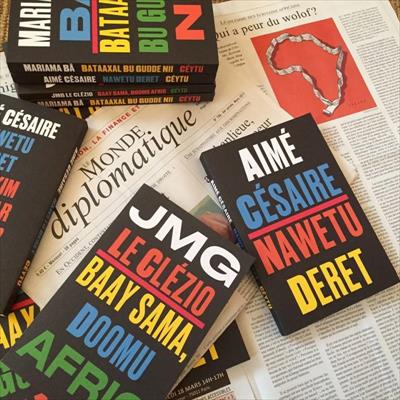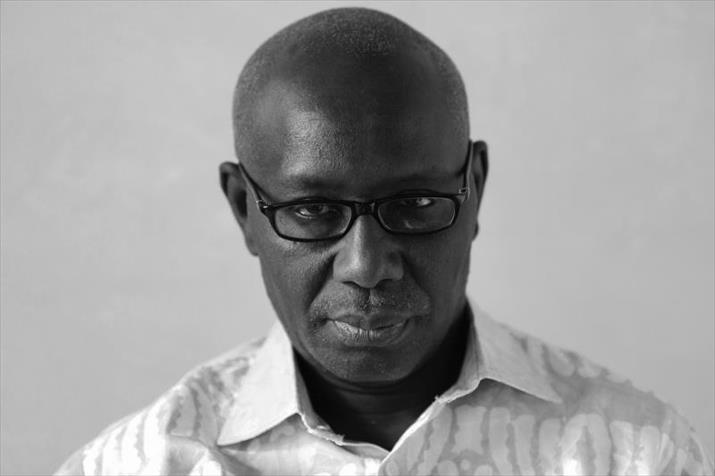|
||||||||||
| Home Nation World Business Opinion Lifestyle ChinAfrica Multimedia Columnists Documents Special Reports |
|
||||||||||
| Home Nation World Business Opinion Lifestyle ChinAfrica Multimedia Columnists Documents Special Reports |
| Africa |
| The World in Wolof |
| A Senegalese author aims to bring world literature to Wolof readers |
| By François Dubé | VOL. 9 July 2017 ·2017-07-14 |

A Senegalese author aims to bring world literature to Wolof readers
When Boubacar Boris Diop authored the novel Doomi Golo (The Hidden Notebooks) in 2003, his first book written directly in Wolof - Senegal's most widespread language, his Senegalese friends kept asking him tongue in cheek whether the French translation would be coming out soon.
That even his own Senegalese countrymen insisted so much, although half-jokingly, on having their language translated into French deeply annoyed Diop, 71 this year, who has been recognized as one of the major African writers and was recipient of the 2000 Black Africa Grand Literary Prize. "They spoke as if they wanted to bring me back to reason, or, to put it more bluntly, to the harsh realities of the market," he said.
It was all the more ironic that his novel, a monologue of an old Senegalese man at the twilight of his life addressed to his young grandson living abroad, touched directly on issues of inheritance and Senegalese identity, subjects dear to this long-time defender of the Wolof language.
"[My novel] has had to learn to fly on its own, and it has faced the many, almost insurmountable and often fatal difficulties of the rare African-language novels in a hostile Francophone environment," wrote Diop.
The book market in Senegal, a former French colony, is overwhelmingly dominated by the French language. Only a limited number of books are published in the Wolof language, in spite of it being the most common language in Senegal with a rich oral culture. But Diop has made his mission to change this.
Thus was born a project to allow the Wolof language to spread and shine both in Senegal and abroad. In March 2016, the writer, assisted by colleagues in France and Canada, established Céytu, the first international imprint dedicated entirely to Wolof.
From vernacular to written
Diop was born in 1946 in Dakar, the capital of Senegal. As a writer, in addition to taking an active part in Senegal's political and social debates, he has always attached much attention to the role of language in contemporary African societies.
"Africa is the continent where the gap between authors and their readers is the greatest. One even comes to doubt that one's national language has the capacity to produce literature," wrote Diop, on the motives behind the imprint. "I have come to understand over time that the essential is not where a literary work goes, but where it comes from."
According to him, Céytu aims at closing this gap by bringing world literature to Senegal through the Wolof language. The project is the fruit of an international cooperation with Diop spearheading the project in Senegal, helped by two of his close friends: Haitian writer Rodney Saint-Éloi based in Canada, and publisher Laure Leroy in France.
The imprint's first three Wolof books were published in 2016, comprising the translated works of the Senegalese Mariama Bâ, the French-Mauritian Le Clézio, and the French Aimé Césaire. In the future, more authors will have their works translated into Wolof including the German Bertolt Brecht, the French Saint-Exupéry, and the Senegalese Aminata Sow Fall.
For Laure Leroy, one of the three co-sponsors of the project, the significance of these books goes far beyond their commercial value. "The principle that ultimately presides over this project is that all languages are equal. Each of them is enriched and nourished by works originally written in other languages. Céytu is above all a strong symbolic gesture," she told ChinAfrica.
Although Wolof literature has existed for a long time, it is impaired by erratic diffusion and low visibility, problems that have been the stumbling block of the book industry on the continent. Céytu hopes to alleviate this situation and ensure that the 11 million Wolof speakers in Africa and abroad can find books in their mother tongue, whether it be in Montreal, Paris, Dakar or on the Internet.

Both universal and specific
Upholding the national language does not mean building walls around it. Diop and his colleagues have been quick to point out that this need to reinvest the vernacular language of Senegal through literature was not born of a desire to isolate the country from the outside world.
"Openness to the other is only possible by a better knowledge of the other in a mutual way, because it is through such reciprocity of exchange and equality that knowledge is nourished," Leroy told ChinAfrica.
A basic principle of Céytu is that one can write and read in Wolof, while remaining open to the world. In fact, Diop - who has long considered South American writers his literary masters - believes a writer has a vested interest in mastering more languages in order to deepen his creative process.
Diop's belief in the importance of using and developing vernacular African languages has been percolating for some time. Already in 1997, in his novel The Knight and His Shadow, he wrote: "The African writer usually writes in a foreign language. Not only does he offer the kind of books people cannot afford to buy, but most importantly, he writes on a continent where everyone speaks."
As such, Diop is part of the wider movement of so-called postcolonial writers, such as the Kenyans Ngîgî wa Thiong'o and Bilkisu Funtuwa, who insist on writing in their vernacular languages, namely Kikuyu and Hausa respectively.
Without complexity
Although doubts have accompanied the publication of the first books, these were quickly replaced with fascination and enthusiasm.
"The first reaction of people when they learn about our imprint is to ask, 'Why publish books in Wolof?' Most people are far from thinking that all languages are equal. But, in the end, the 'why' quickly becomes a 'why not.' And this is a great victory," explained Diop to the French magazine Le Point Afrique.
Leroy sees behind the imprint an essential quest for equality: "With time, the idea [of publishing in Wolof] gradually made its way. It is also part of our objectives that such an undertaking is not taken as an incongruity but as something obvious," she told ChinAfrica.
For Ibrahima Wane, African Civilizations and Literature Professor at Cheikh Anta Diop University in Dakar, Diop's resolve to write and publish in Wolof means "the only mode of expression that the writer considers appropriate is his mother tongue." This naturally leads to the affirmation of African languages as a way to create a literature, a more broadly a culture, that is autonomous, says Wane. It therefore has implications that goes beyond the realm of literature.
Alhassane Diop, President of the Association of Senegalese Students in China and avid connoisseur of African literature, welcomes this initiative and believes that Wolof will occupy an increasingly important place in cementing the country's future development.
"The Wolof is the lingua franca of Senegal. In addition, the Wolof ethnic group is a historical blend of all the ethnic groups of the ancient kingdoms that coexisted on the Senegalese plains," he told ChinAfrica. In other words, this imbrication has made [the Wolof language] a means of communication and national cohesion, and even of eradication of illiteracy."
It is to this vision that Céytu seeks, in its own modest way, to contribute.
| About Us | Contact Us | Advertise with Us | Subscribe |
| Copyright Beijing Review All rights reserved 京ICP备08005356号-5 京公网安备110102005860号 |